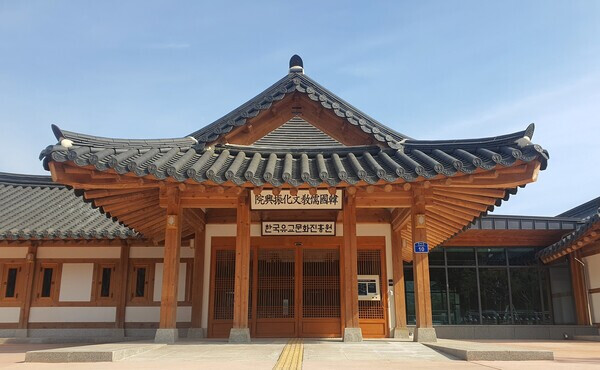
A Delightful Meeting of Tradition and Modernity: Sijo Reborn as K-POP Rap
The Korea Institute of Confucian Culture (hereinafter referred to as "KICC") successfully launched <Sijo Baeul Lab>, a convergence content program that combines sijo, a traditional Korean poetic form, with K-POP rap, opening a new chapter in traditional culture education. The inaugural program, held on May 29 with students from Nonsan Noseong Middle School, went beyond simple education. It offered students a special opportunity to write their own stories in sijo form, express them through rap, and simultaneously foster creativity and self-expression. This initiative is regarded as a prime example of how traditional culture is not merely a relic of the past to be preserved but a living culture that can effectively communicate and resonate with the modern younger generation.
The "Sijo Baeul Lab" program originated from the fresh idea of "reinterpreting our traditional sijo in a modern and creative way through rap." Traditional Korean cultural education has often been confined by the prejudice of being difficult and tedious. However, with K-POP dominating the global stage and becoming a familiar cultural icon for the younger generation, attempting a new approach to sijo by utilizing rap as a modern medium was a very clever strategy. This played a decisive role in stimulating students' interest in Confucian culture and eliciting their active participation.
The Educational Process Where Sijo's Depth and Rap's Rhythm Harmonize
The program began by examining "Hayeoga" by Yi Bang-won and "Dansimga" by Jeong Mong-ju, both historical figures from the late Goryeo Dynasty. Students understood the poets' emotions and philosophies embedded in these two works. Furthermore, by analyzing the similarities and differences with rap battles seen in TV entertainment programs, they naturally grasped that rap as a genre is an art of expression beyond mere entertainment. The process of exploring how historical figures' sijo could connect with contemporary rap brought about significant educational effects, allowing students to simultaneously recognize the continuity and change of culture.
Subsequent activities provided practical time for students to learn the basic structure of sijo and the core elements of rap: Rhyme and Flow. Rhyme plays a role in forming rhythm and enhancing the fun and completeness of lyrics, while flow is a crucial element that determines the individuality and rhythm of the rapper. Students directly experienced the fun of rap through a quiz where they listened to lyrics and guessed the title, understanding how these elements harmonize to create a single work. In particular, the highlight of the <Sijo Baeul Lab> program was the process where students directly wrote their own thoughts and experiences into lyrics and presented them as rap. This was a creative experiential platform that went beyond simple knowledge transfer, allowing students to produce content themselves and express their self through it.
One student who participated in the program shared their feelings, saying, "Today I learned for the first time that rap isn't just about speaking fast, but an art of expressing my honest story to the beat." They also added, "I properly discovered the charm of sijo, which I had only briefly encountered at school, and I feel more confident about solving related questions if they appear on future exams," suggesting that the program could also have a positive impact on academic achievement. Such student responses are evidence that <Sijo Baeul Lab> successfully captured both fun and learning effectiveness.
Cradle for Nurturing Talent to Lead Future K-Culture
Jung Jae-keun, Director of the Korea Institute of Confucian Culture, expressed his aspirations, stating, "I hope this program served as an opportunity for students to discover the new charm of Confucian culture and traditional culture." He added, "Moving forward, KICC will actively support various programs that enable students to creatively express their thoughts by converging tradition and modernity, and furthermore, we will do our best to nurture talent who will lead future K-Culture based on our own culture." Director Jung's remarks emphasize that <Sijo Baeul Lab> is not merely a one-time educational program but an investment in the future of Korean culture from a long-term perspective.
Indeed, the Korea Institute of Confucian Culture has been making various efforts to modernize and spread Confucian culture. While maintaining existing frameworks such as traditional seodang (village school) cultural experiences, Confucian scripture readings, and character education programs, they are also actively developing convergence content like the <Sijo Baeul Lab> that utilizes media familiar to the younger generation. These efforts demonstrate that traditional culture is not the exclusive property of a specific generation but a dynamic asset that all generations can enjoy and develop.
The <Sijo Baeul Lab> program is currently accepting registrations on a first-come, first-served basis. Schools or organizations wishing to participate can inquire with the Korea Institute of Confucian Culture representative (☎041-981-9924) or check the KICC website (ikcc.or.kr) for more details. The expansion of such programs is expected to contribute to further expanding the scope and solidifying the foundation of K-Culture, especially at a time when the world is paying attention to Korean culture through K-POP, by interpreting Korea's profound traditions through the modern language of rap. The future endeavors of <Sijo Baeul Lab>, which has showcased the infinite possibilities of Korean culture through a successful fusion of tradition and modernity, are highly anticipated.
[Copyright (c) Global Economic Times. All Rights Reserved.]






























